Investment Mis-selling: Counting the Cost A Report by Goodwin Barrett
Published on:
Introduction
Losing money is a risk any investor has to accept, and most people do accept it. But every investor, no matter what their level of experience, deserves to understand exactly what they are risking and where their money is going. When a high street bank is found to have systematically mis-sold thousands of investments – usually preying on older customers with savings to invest – the level of outrage it sparks is understandable.
Sadly, the sheer size and scale of investment mis-selling by UK banks has gradually come to light over the last decade. Even the largest banks have posted quarterly losses as a direct result of payments to cover financial misconduct, including investment mis-selling, as they are forced time and again to pay millions of pounds in fines and compensation. Yet investment mis-selling has not gone away.
We can see what impact mis-selling in general has on the banks by analysing their profit margins, but what about the effect it has on the investment customers who have had a portion of their hard-earned savings stolen away from them? How many of them have had their retirement years disrupted by unscrupulous bank advisers? How many feel angry at the bank that treated them so badly?
This report examines the impact investment mis-selling has had on the people affected by it, and it tries to understand how their experience has changed their level of trust in the high street banks. As far as we know, this is the first report to focus solely on investment mis-selling victims. Their views deserve to be heard.
To create the report we sent a brief survey to a group of our former clients, each of whom have successfully claimed compensation for investment mis-selling from a high street bank. The survey contained some simple questions designed to learn more about their thoughts and feelings following their experience.
We are extremely grateful to the 112 victims of investment mis-selling who agreed to complete our survey to share their views. We hope that banks and investment firms alike will be able to gain a better understanding of the long-term effects of investment mis-selling on their customers.
Summary
-
The consequences are real.
Importantly, the survey responses highlight the real consequences of investment mis-selling. More than one third of our respondents stated that their experience impacted on their mental, emotional or physical wellbeing – not always a comfortable thing to share in a survey – and a smaller number (8 people) actively sought counselling or another form of medical support as a result.
-
Older people face an uphill struggle to get their retirement back on track.
More than half of our respondents (55%) have had their retirement plans disrupted as a direct result of their mis-selling experience. None of them were informed by their bank that they could claim compensation to recoup their losses. 9 out of 10 were completely unaware of any rules that existed to protect them from mis-selling when they were discussing the investment with their advisers.
-
The trust gap between the banks and their customers is widening.
Nearly every one of our respondents – 99%, a startling figure – stated that financial regulators need to do more to keep the banks honest. Only one respondent answered differently (they said they did not know). Just over two thirds admitted they do not trust the banks to provide sound financial advice at all times; half believe the banks only care about profit. Finally, 3 in 5 respondents said they plan to purposefully avoid using a high street bank if they ever decide to invest again in the future.
The suffering experienced by victims
One of our aims is to help a wider audience understand the suffering experienced by the average victim of investment mis-selling, not just the extraordinary ones.
Typically, whenever investment mis-selling is featured on the news, the stories focus on how much the banks have to pay out in fines and compensation. Very little is said about the long-lasting damage to the victims, and what precious airtime they do receive is often restricted to a very small number of high-profile, usually unrepresentative, cases.
Hundreds of thousands of people are mis-sold every year in the UK. The victims are usually older people, sometimes vulnerable, with savings to invest. The impact of losing the money they put away for their retirement can be devastating, and many do not see their money returned to them for months, even years.
To illustrate this, we asked our 112 respondents whether their experience had caused any damage to their wellbeing. This is not an easy thing to share, especially when it is put so directly, but 38 people said that they did in one form or another – over a third of respondents:
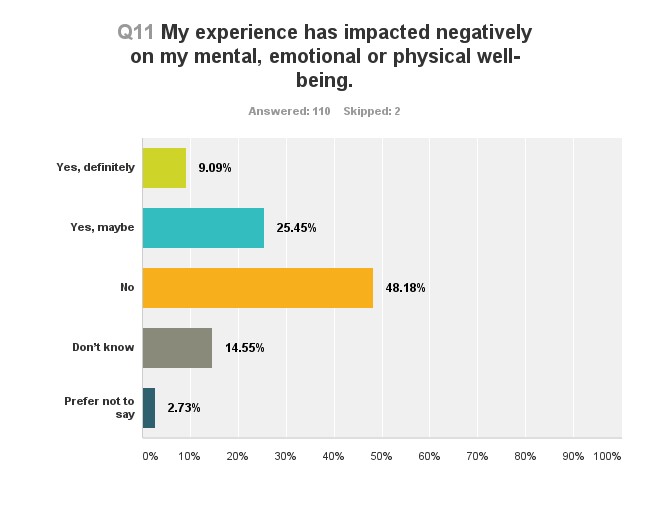
The table above might look as though the number of ‘No’ people outnumber the ‘Yes’ people significantly. But what compounds this is the fact that fewer than half our respondents, only 53 people, answered with a definite ‘No’. Compare the important figures then – 53 people to 38 – and the gap is revealed to be much closer in reality:
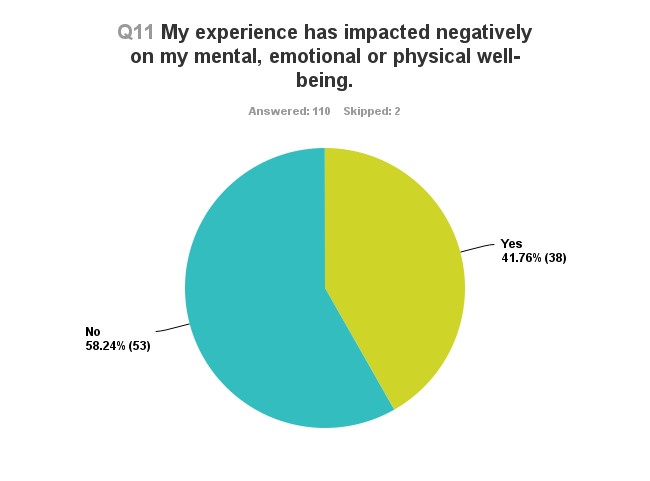
The number of older people who say they have suffered raises an intriguing question: how many of the victims of investment mis-selling choose to seek support as a direct result of their experience? In fact our survey revealed that at least 8 people sought some form of medical support.
It is difficult to define exactly what this number signifies without more information; we cannot know why the remaining 30 victims chose not to seek support. But the fact remains that some did, whether that support was counselling, therapy or otherwise. If nothing else, it may well have been a further expense.
For the banks that were supposed to help these people attain peace of mind in their retirement, it is a serious indictment to be the direct cause of their suffering.
Case Study: Fred Hardman
Grieving widower targeted by mis-selling
Fred Hardman received a substantial pay-out from an insurance policy after he sadly lost his wife. Mr Hardman was still grieving, not to mention suffering from other health concerns, when an adviser at his bank approached him about making an investment with his late wife’s insurance money.
Mr Hardman was under the impression that his money would be secure, and since he was off work long-term due to poor health, he relied on the return from his investment as a source of income.
Later on, however, he realised that his investment had considerably dropped in value. He was, understandably, highly concerned. Not only had the bank failed to inform him that his income was being taken out of his initial capital, but we found that they failed to take his concerns into account when he was advised on his investment options. He had been a victim of investment mis-selling.
Fortunately Mr Hardman reported the problem and received a compensation payment of £6,916 from the Halifax.
The vulnerability of older people to investment mis-selling
To try to understand the practical impact of mis-selling on older people, we wanted to know whether their experience caused disruption to their retirement plans.
In best-case scenarios, bank advisers make it their business to ensure that a secure and comfortable pension underpins whatever plans their customers have for their retirement, whether that includes travel, new accommodation, medical support, caring for their relatives or anything else. Investment mis-selling has the potential to destroy those plans entirely, and at the very least cause disruption and stress for older people who simply wish to enjoy their retirement.
The victims we surveyed are relatively lucky in that they did receive compensation from their banks; there are those who do not secure compensation even if they deserve it. Despite the fact that all our respondents managed to recoup at least part of their losses, over half stated that their retirement plans were disrupted as a direct result of their experience:
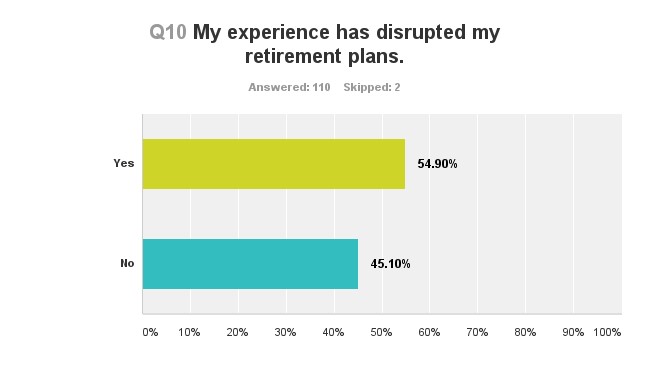
Security is a top financial concern for many retirees, and many of our clients initially trusted their banks not to recommend an investment that would incur too much risk to their savings. Many told their advisers that they would depend on their investment to help them pay their way.
When mis-selling causes direct disruption to retirement plans, then, a major factor is how dependent the victim is on the advice of their adviser. Because most people are not, after all, investment experts, there is a duty on the banks to provide sound financial advice.
In the survey, we asked respondents a series of questions designed to highlight the ease with which mis-selling is carried out. The vast majority, for example, were unaware that their adviser was supposed to ask certain questions about their circumstances and attitude to risk. In fact, 9 out of 10 were unaware of any rules that might exist to protect their interests:
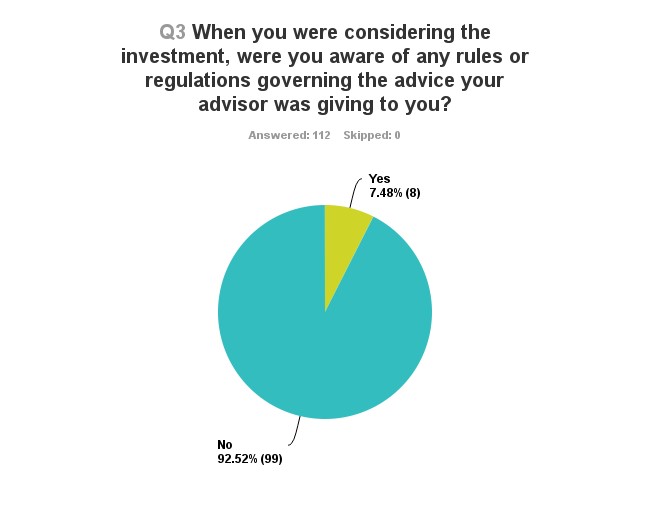
While older people are technically protected by regulations when they are speaking to an investment adviser, especially one from a high street bank, the responses show that most do not fully understand their regulatory rights and are, therefore, vulnerable to inappropriate investment advice.
Since they understand the potential for their customers to be mis-sold investment products, do the banks then act responsibly to correct their mistake, perhaps by providing information about claiming compensation so that their mis-sold customers can recoup any lost savings? The answer, it would seem, is no.
We asked our respondents how they found out about mis-sold investments. This was not a question about marketing: we wanted to know whether the original information about making a claim had come from their bank. One respondent wrote in to tell us that they had heard about making a claim from a “bank member”, but all others learned about it from other sources – not one person had first heard about it from their bank.
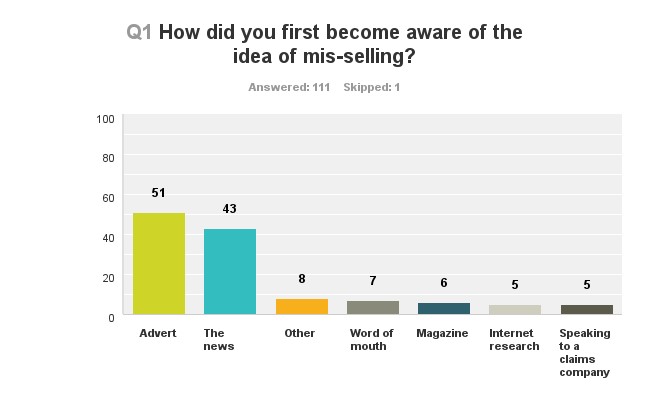
It’s clear that older people who are planning their retirement are seriously let down by their banks in cases like these. Not only are they kept in the dark about their rights under the increasingly extensive regulations that govern all financial advice, but they are not told how to recoup their losses when that bad advice turns into a bad investment. It’s little wonder that so many hard-earned retirements are spoiled by investment mis-selling every year.
Case Study: Patrick Caulfield
Retiree let down by his bank
Mr and Mrs Caulfield were contacted by Barclays when he received his lump sum pension after he retired in 2007. Despite making it clear to their adviser that they were intending to move house in the near future, they were advised to invest a large sum of their savings for a period of five years. A number of further considerations that should have been taken into account were clearly disregarded – a fact of which Mr and Mrs Caulfield were not made aware.
The retired couple lost a large portion of their investment. Until they saw an advert for our services, however, they did not know that any options were available for them to recoup their losses. They lodged a formal complaint with their bank and, following an investigation by Barclays, they were awarded just over £16,000 in compensation.
The accelerating decline of consumer trust in the high street banks
The landscape of financial regulation has shifted considerably in the last two decades. As more cases of mis-selling come to light, regulators look for more ways to prevent customers losing money due to inappropriate investment advice. Yet it’s clear that the victims of investment mis-selling do not feel sufficiently protected.
The British public has been losing faith in the high street banks for a long time, and the sheer size and scale of the mis-selling scandal has done nothing to bridge the widening chasm between the banks and their customers. It’s not surprising that the victims of investment mis-selling – the people who have witnessed first-hand the effects of negligence from bank advisers – would have the strongest feelings on the matter.
We asked our respondents whether regulators should do more to keep the banks honest. An astonishing figure – 99% – said yes.
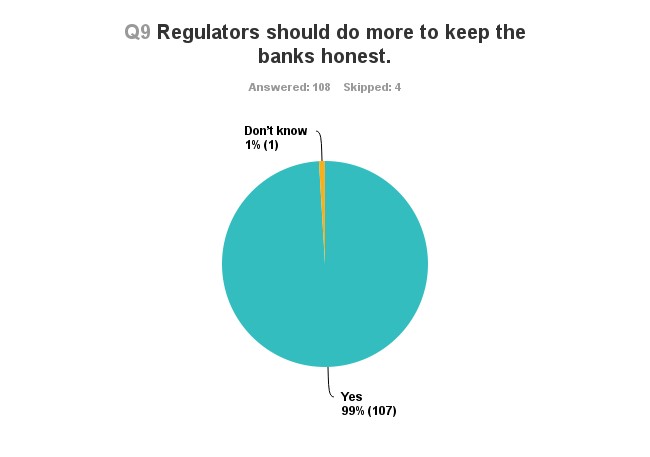
The strength of feeling on this point echoes a wider trend in British banking: the steadily widening trust gap between the banks and their customers. Critics have written about this for years. One recent study, for example, found that only 36% of people on average trust their high street bank.
We wanted to know more about how the victims of investment mis-selling feel about the high street banks. We shared fourteen statements, seven negative and seven positive, each of which were intended to reveal the perception our respondents have regarding the trustworthiness and reliability of the high street banks. The respondents were asked to tick any statements that apply to them (no attempt was made to bias the statements in favour of one or the other). This was the result:
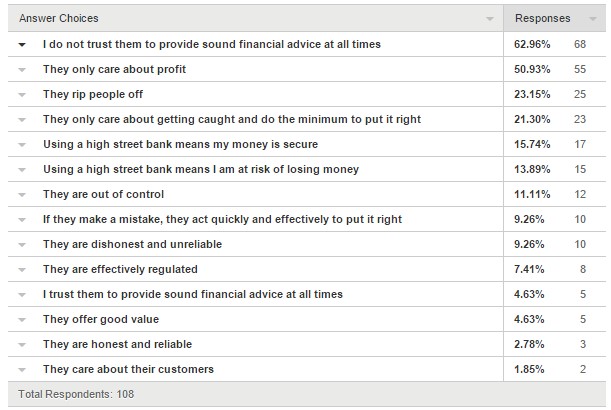
Most of our respondents have either lost or never had much faith in the banks: positive statements were ticked under a quarter as many times (50 ticks) as negative statements (208 ticks).
The top two in the table above account for most of the ticks for negative statements. They show that two thirds of our respondents do not trust the banks to provide sound financial advice, while half believe the banks only care about profit. 1 out of 5 believe either that the banks “rip people off” or only do the minimum to correct a mistake.
Interestingly, looking at the positive statements, more people believed that their money is secure with a high street bank than believed the banks are reliable, provide sound financial advice or are effectively regulated – combined. Only two people believe that the banks care about their customers.
To probe the issue further, we wanted to know exactly what practical effects the widening trust gap might have on British banking. We asked respondents whether they were willing to invest again in the future and whether they would be using a high street bank for their purchase. Only six people said they were not put off investing by their experience:
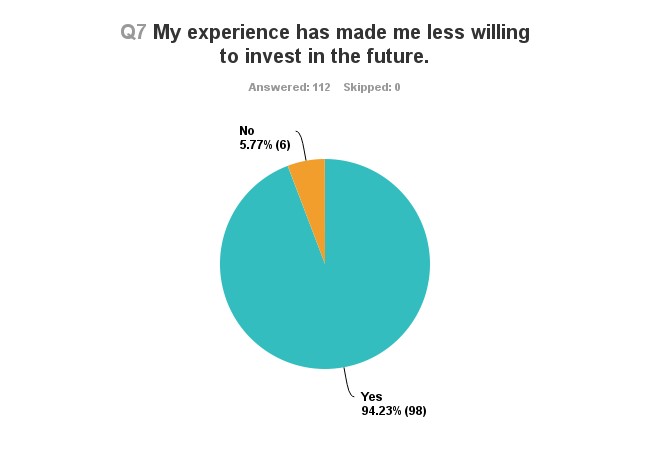
Only slightly more people (1 in 10) said that, if they were to invest in the future, they would indeed be using a high street bank. A much larger number, however, said they would not (3 in 5), and there was also a degree of uncertainty: 1 in 5 said they were not sure whether they would be using a bank. This kind of hesitancy was unusual in this survey – most of our respondents were reasonably sure about their answers to the other questions.
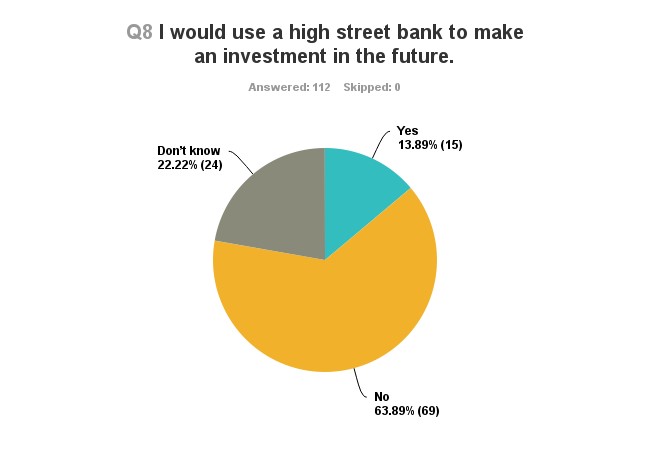
It’s clear that the victims of investment mis-selling have been left deeply distrustful of the banks following their experience, but the results of this survey indicate a more worrying sign that British banking is in need of reform. The fact that some of the UK’s biggest banks have recorded quarterly losses as a direct result of having to set aside compensation payments may only be a short-term problem. The above results appear to indicate that, unless the banks crack down on investment mis-selling, they risk putting off potential future investors permanently.
Last year a new Banking Standards board was set up to improve the banks and help them win back public trust. As Chairman Dame Colette Bowe unveiled her new board in April, she knew they had a hard task. She said: “A healthy society and a vibrant economy like the UK needs well-run banks and building societies that understand and serve the needs of people and businesses.”
“But trust in the system has been badly damaged and it’s no surprise that the public expects change after everything that has happened.”
Final thoughts
The results of this survey show the real price that the victims of investment mis-selling pay for flawed financial advice, especially older people. Not only do they lose part of their pension, redundancy money, inheritance or savings, but they also suffer enormous stress at the hands of their bank, leading some to seek medical support to help them get through this difficult period in their lives. For many of them, the investment was intended to give them peace of mind, helping them pay their way through their retirement years. But sadly the peace of mind they hoped for in retirement is often shattered by investment mis-selling. It’s likely that a number of people have to change their retirement plans altogether as a result.
Perhaps the worst part is that they are suffering needlessly. We can see from the results of this survey that a worrying number of investors remain uninformed about the rules and regulations laid down by the Financial Conduct Authority, among others. These rules are intended to protect investors against unscrupulous sales tactics and misinformation from investment advisers who are often under pressure to meet their own targets. And once it becomes clear that bad advice has resulted in a bad investment, the victims are effectively left to fend for themselves. Unless they happen across an advert, catch a story on the news or do their own research, they are typically unaware that anything can be done to recoup their losses.
It’s clear that British banking is failing to win back customer trust. The results of this survey is just a small indication of the strength of feeling on this point. In fact, a number of our respondents wrote to us specifically to express their opinion on the reliability of the high street banks. These are just some of the comments we received:
“Since deregulation of the banks they are out of control. Their customers and the British taxpayers have funded their ‘foolery’.”
“I have noticed that at any time you appear to have any spare money, they quickly want to offer advice. But if you dispute something, they appear to misunderstand your issues and send you a generic response which shows that they either did not listen or chose to hear only what they wanted to hear.”
“I have been a customer of the TSB for about 50 years, but they never acknowledged my concern at the amount of interest I received for my investment. They didn’t even reply to my letter.”
“I do feel sorry for the people who work in the banks. It must be awful to be made to knowingly rip people off, and if you don’t do your job as you are told, you lose your job.”
“On the whole I think banks don’t support you if they think you are in difficulties.”
“Closing teller counters shows just how much they care for their customers, especially the older ones.”
As long as the high street banks continue to hit the headlines over and over for mis-selling scandals, it’s difficult to see how they will convince customers that they are genuinely interested in the wellbeing of their customers.
We’d like to sincerely thank the 112 people who completed the survey and responded so open and honestly about how their investment mis-selling experience has impacted upon them.









